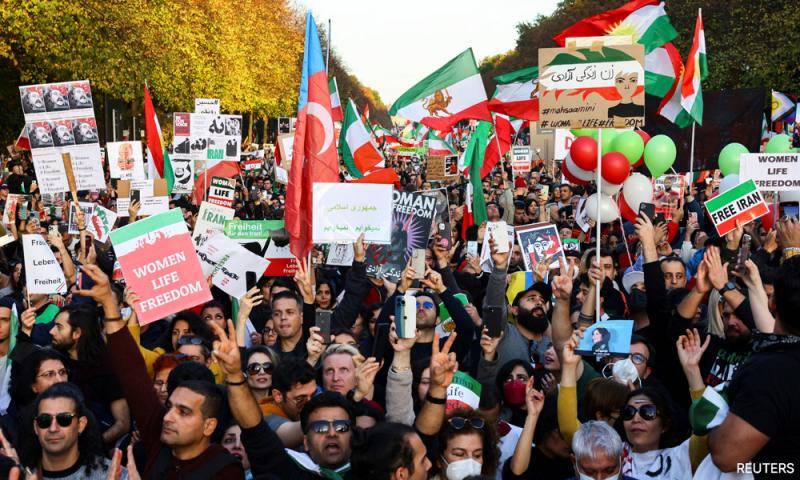
The ongoing, interesting, complex, and intersectional uprising in Iran has ethnic, class, and gender diversity against a very oppressive and corrupt system, which people earlier misread as a pure, genuine, and honest system.
These views were expressed by Shahla Haeri, an expert in Iranian anthropology, while speaking to Dr. Ayesha Siddiqa, host of Naya Daur TV’s program Neighbors Talking.
The learned guest was asked to comment about the movement in Iran, particularly by women, under the slogan of “women, life, and freedom.”"In these three words, #WomenLifeFreedom #زن_زندگی_آزادی, you can understand dynamics of this movement/uprising in Iran. It is absolutely beautiful... because patriarchal regimes are terrified of women.
Ms. Haeri highlighted the fact that the death of 22-year-old Mahsa Amini in September galvanized women who objected to the oppression, as well as men who wanted the females in their family to be treated fairly.
To a question, the expert stressed that the women in the Iranian society have lost the choice to wear the veil.
“Choice is the operative word here,” she told Ms. Siddiqa. “One shouldn’t be forced to wear it. That said, if I want to wear that, so that’s my choice and I should be able to do that [as well].”
She added that “being forced to not wear the veil is also a problem, as what happened in 1936 to ‘modernize’ Iran.”
She opined that the 1979 revolution was a popular revolution, not an Islamic one, as it involved people of different backgrounds, ethnicities, and religious minorities.
To a question about how challenging the situation can be for the ruling regime, Ms. Haeri said it was difficult to predict, but pointed that the dissatisfaction is about the regime’s performance, economically, politically, and militarily.
Haeri added that the very seed of oppression, dictatorship & authoritarianism is there in #Iran's "Wilayat-e-Faqih" regime. It's particularly poignant as it legitimates itself through religious justifications, taking it outside realm of legislation.
In terms of comparison between the two societies, she said that contrary to Iranian society, she witnessed the women in Pakistan having the freedom to express their views. “They also seemed more aware of their situation.”
While responding to another question, the expert deemed it unfair to label the women’s movement in Pakistan as ‘elitist’, saying such movements around the world have been spearheaded by middle-class women.
https://www.youtube.com/watch?v=c9s0wbKQBG4
These views were expressed by Shahla Haeri, an expert in Iranian anthropology, while speaking to Dr. Ayesha Siddiqa, host of Naya Daur TV’s program Neighbors Talking.
The learned guest was asked to comment about the movement in Iran, particularly by women, under the slogan of “women, life, and freedom.”"In these three words, #WomenLifeFreedom #زن_زندگی_آزادی, you can understand dynamics of this movement/uprising in Iran. It is absolutely beautiful... because patriarchal regimes are terrified of women.
Ms. Haeri highlighted the fact that the death of 22-year-old Mahsa Amini in September galvanized women who objected to the oppression, as well as men who wanted the females in their family to be treated fairly.
To a question, the expert stressed that the women in the Iranian society have lost the choice to wear the veil.
“Choice is the operative word here,” she told Ms. Siddiqa. “One shouldn’t be forced to wear it. That said, if I want to wear that, so that’s my choice and I should be able to do that [as well].”
She added that “being forced to not wear the veil is also a problem, as what happened in 1936 to ‘modernize’ Iran.”
She opined that the 1979 revolution was a popular revolution, not an Islamic one, as it involved people of different backgrounds, ethnicities, and religious minorities.
To a question about how challenging the situation can be for the ruling regime, Ms. Haeri said it was difficult to predict, but pointed that the dissatisfaction is about the regime’s performance, economically, politically, and militarily.
Haeri added that the very seed of oppression, dictatorship & authoritarianism is there in #Iran's "Wilayat-e-Faqih" regime. It's particularly poignant as it legitimates itself through religious justifications, taking it outside realm of legislation.
In terms of comparison between the two societies, she said that contrary to Iranian society, she witnessed the women in Pakistan having the freedom to express their views. “They also seemed more aware of their situation.”
While responding to another question, the expert deemed it unfair to label the women’s movement in Pakistan as ‘elitist’, saying such movements around the world have been spearheaded by middle-class women.
https://www.youtube.com/watch?v=c9s0wbKQBG4

